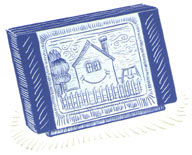Home Sweet Home is not as sweet as some feel it should be, and the trend is to get out of it if it proves disappointing. In striving to develop homes that work, people are doing a favour to society, and even more so to themselves…
“Home” is a warm and fuzzy word; more fuzzy than it is warm, when you come to think of it. At first its meaning seems straightforward enough – it is where you live, right? But then along comes someone like the celebrated American madame Polly Adler to remind us that a house is not a home, as she did in the title of her memoirs. In fact, a home need not even be a house: it could be a neighbourhood, a town or city, a region or a country, depending on how you view it at the time.
To add to the fuzz, the word is often used euphemistically to describe places that are not very homey at all: a nursing home, a mental home, and – the ultimate absurdity – a funeral home. It also serves as a euphemism when real estate agents sell buildings, or parts thereof, which they call homes. They sometimes refer to them as dream homes, which is valid in a roundabout way since what they are selling is a dream and not an object. They are appealing to the prospective buyers’ hopes that the bare-bones houses or condominiums they have on offer can become homes in the fullest sense of the word.
The folksy American versifier Edgar Guest once wrote that it “takes a heap o’ livin’ in a house t’ make it home,” to which his fellow rhymester Ogden Nash added that it also takes a heap o’ spendin’. But Guest, of course, was right and Nash was wrong, however wittily. As many multi-millionaires have learned to their regret, a true home is something money can’t buy.
It was Pliny the Younger who reputedly said circa 100 B.C. that home is where the heart is. His point is bolstered by the fact that people will speak longingly of “back home” in reference to a place where they haven’t lived in years. Conversely, when families in our peripatetic western society move from one locality to another, it does not matter greatly which particular four walls surround them or where they are situated. If a family is solid enough to have a true home, it travels with them wherever they go.
At the same time, it is a mistake to think of a home strictly as the preserve of the conventional two-and-a-half-child family. Many lone individuals fashion perfectly agreeable homes for themselves, often in the company of a pet or two. Every North American family, it seems, includes at least one indomitable aunt who lives contentedly by herself, or a bachelor uncle who treasures the rugged individualism of keeping his own household. Then there are the more bizarre departures from the norm, such as convicts who, when released, will deliberately commit offences to be put back behind bars, where they feel at home.
If the traditional notion of a home was never quite exact, it has become less so in the second half of the 20th century. The definition of what constitutes home life has been expanding ever since the 1960s, when young people in North America and Europe mounted a social revolution against the meat-and-potato values of the past.
The stereotypical home of the time, nestled in the suburbs with its well-trimmed lawn and built-in garage, made a natural target for those who sought to shake western society out of its materialistic complacency. Soon hippy communes sprang up which nurtured the very antithesis of the suburban ethos, particularly with regard to money and monogamy.
Time has smoothed out the angry edges of that revolt, and most erstwhile hippies have since discovered that middle-class conformity is not so unbearable after all. Nevertheless, home life has taken on new non-standard forms. Divorce and separation have become much more common, and therefore many more households are now composed of adults living by themselves or with a child or children. It has become increasingly acceptable for unmarried couples to live together, including those of the same sex.
” There is a magic in that little word, home; it is a mystic circle that surrounds comforts and virtues never known beyond its hallowed limits.”
– Robert Southey
Lean and mean economic conditions have brought together groups of young adults to share living space and thereby reduce individual expenses. Men and women in their twenties and thirties who are unable to find well-paid jobs may continue to live in their parents’ houses. People with disabilities share group homes, and elderly persons are able to find a degree of independence in their own apartments in seniors’ residences. All of these developments have brought new interpretations to what is meant by home.
Also, the economic stringency of recent years has left large numbers of people with no homes of any description. Adding to the ranks of adults on the streets are the “street kids” who have broken away from their families. No doubt there are those among the homeless who are contented with their lives, at least for the time being; on the whole, however, they are much to be pitied. This is not only because of their wretched physical circumstances, but because they have somehow missed out on the precious privilege of a good home life.
Street kids are doubly deprived, because, having repudiated their parental homes, they have no homes either past or present. It is standard practice for people in a country with a high mobility rate like Canada to cherish two homes – the current and the original one.
Even motherhood has changed
The feeling people have for their old homes can only be described as sentimentality. The innumerable songs and poems about home – many of them coming out of wartime, when homesick men and women in uniform were scattered all over the world – are as sentimental as can be. And why not? Sophisticates object to sentimentality because it places emotion above reason, the heart above the head, but less critical folk occasionally like to sit back and enjoy it. Sentimental feelings are aroused by image association; to those with the good luck to have come from well-adjusted families, nothing has more heart-warming associations than the family home.
If there is one subject about which even more sentimental words and music have been written about than home, it is motherhood. The two are closely connected, of course, for the mother is usually the catalyst of the family. It is she who gives a household the homey touch with things like frilly curtains, knick-knacks, house plants, and the smell of sweet treats baking. But motherhood, too, has changed since so many women began working outside the home. No love is stronger than that of a mother for her child, but mothering has lately become more difficult because of the burdens of doing another job.
When married women stayed at home, they were referred to rather patronizingly as homemakers. With mothers today tired and preoccupied after a hard day’s paid work, it is incumbent upon the man of the house also to function as homemaker, sharing in housekeeping and child-rearing chores. In earlier, less complex times, a good home might be allowed to develop by itself; these days, however, its development can by no means be taken for granted. Responsible parents must literally “make” a home for their children through the application of thoughtfulness, good example, patience, forgiveness, firm but fair-minded discipline, and tender loving care.
This delicious home feeling
Needless to say, making a home is not an easy task; it never has been. One factor that adds difficulty to the undertaking in western countries nowadays is a diminution of religious faith, once an essential element of the fabric of families everywhere. However perfunctorily it may have been practised, religion was an influence for discipline among children and, for that matter, their parents. Its disappearance from the daily life of the average modern household is consistent with a general social liberation which has made children and especially teenagers less susceptible to parental control.
” It was the policy of the good old gentleman to make his children feel that home was the happiest place in the world; and I value this delicious home-feeling as one of the choicest gifts a parent can bestow,” wrote the 19th century American author Washington Irving. For responsible parents, the first line of defence in keeping their offspring safe from harm is just such a policy, aimed at making their home the kind of place where the youngsters will want to spend a large proportion of their leisure time.

Given that this is easier said than done, the objective should be to establish an atmosphere that is pleasant enough so that the children want to invite their friends into it instead of always going out with them. For, as the French philosopher Blaise Pascal observed, most of the trouble in the world arises from the inability of human beings to stay in a room.
A refuge from the cold-blooded world
Fortunately, establishing an attractive milieu for youngsters is a self-fulfilling labour of love, because a pleasant atmosphere for children is also a pleasant atmosphere for their elders. There is a strong creative aspect to homemaking, and it can offer rare personal satisfaction to people who channel their creative instincts into domesticity. In its appointments, even in its clutter, a home is a reflection of the tastes and talents of its occupants. Be it a mansion or a one-room apartment, it is an expression and an extension of oneself, proclaiming: “This is who I really am.”
A psychologist would say that home is the place where we become socialized. How we relate to the world in later life hinges upon what we have learned about getting along with the co-inhabitants of our original homes. Home is where we learn to defer to the feelings and interests of others; where we learn, through doing chores, to shoulder our share of responsibility within a system of interdependence. It is where we learn to mind our manners, to resolve our differences with others, to own up to our shortcomings, and to apologize when we are wrong.
Perhaps what endears human beings most to home is the comfort it provides when they are most in need of it. We find out as little children that it is where to run when we are hurting from a skinned knee or a blow to our self-esteem – where our tears will be dried. It continues to fill this role long past childhood: “Home is the place where, when you have to go there,/They have to take you in,” as Robert Frost pragmatically wrote of the imperatives of family relationships. Grown “children” will often turn up on the parental doorstep when they have been dealt a setback by the outside world.
– Oscar Wilde
To householders themselves, home is a refuge from the cold-blooded world in seemingly minor ways that are nonetheless vital to their spiritual well-being. It is where we stay on days when we do not feel well; where we soak our aching limbs in hot baths and ease our weariness by going to bed early with a good book. It is where we can loosen our clothes, be as silly and eccentric as we like, indulge our habits, love our loves, pet our pets, and follow our hobbies. It is where we establish our own private traditions in the form of favourite dishes, ritual celebrations and “in” jokes.
In a corner of hell

A healthy home is normally a place of laughter and fun, but not always. For it is also where we face our personal upsets, disappointments, sorrows and tragedies. It is where we go after a loved one’s funeral to be consoled by relatives, friends and neighbours. The latter individuals, incidentally, form a vital part in the make-up of a home in good times and bad.
But though home can be a source of great comfort and joy, we have been talking here so far about the ideal home – and life, as we all know, holds few ideal arrangements. The hard fact is that home can be a running nightmare if the relationships within it are bad.
If the homeless are to be pitied, so are those who live in households riven with conflict, bitterness and grudges. No one would want to be in the position of the fictional girl in Louise Cass’s poem: “And this is the Way/We start the day/In a corner of Hell called Home.”

Movies and television shows once conveyed the impression that to live in a happy home was as natural as breathing. Television programming has become a bit more realistic than when it came in black and white, and situation comedies may now include the occasional episode in which there is just a hint of family discord. But the screaming quarrels that can break out in actual families are seldom if ever shown.
While the entertainment and advertising media continue to serve up syrupy dollops of domestic bliss, the news media jolt us back to reality by informing us about homes that are racked by child abuse and domestic violence. Newscasts tell us of a shockingly high number of teenage suicides, which are surely a sign of widespread domestic unhappiness. Meanwhile, marital break-ups, once rare occurrences in North American communities, have become routine.
” To be happy at home is the ultimate result of all ambition…”
– Samuel Johnson
So in all too many cases there is trouble in the modern home, blissful appearances notwithstanding. This is paradoxical because on average, homes in western countries have never been as comfortable in the material sense as they are now. It would seem logical that the cornucopia of entertainment offered by cable and satellite television, videos, compact discs, the Internet and the like would make today’s young people more content to stay close to home than previous generations. Instead, large numbers of teenagers seem bored with domestic life, and seek relief from their boredom in potentially self-destructive ways such as taking drugs.
Knowing how to forgive and forget
“A great obstacle to happiness is to expect too much happiness,” wrote the French man of letters Bernard de Bouvier de Fontenelle. The reason that people today appear overly amenable to breaking up or breaking away from their homes may be that they have been conditioned to expect too much from life.
Here we come again to the place occupied by that influential inhabitant of the contemporary home, the television set. With their fictitious images of effortlessly joyful homes, TV shows and commercials are likely to lead people to aspire to home lives that are too good to be true – and to reject those that fall short of the idyllic representations on the screen.
Trouble at home is like trouble anywhere else. Rather than trying to run away from it, the preferable course is to try to correct it if humanly possible, and that entails the difficult feat of subduing one’s pride and ego. The best of families are those whose members know how to forgive and forget. The efforts required to chase trouble away from the door may include putting the family ahead of work, regardless of the amount of money that work may bring into the household coffers. It is not just a homily that money can’t buy happiness. It can buy a beautiful house, but the time-consuming (and, not uncommonly, soul-destroying) quest for it might bring nothing but misery to the people who dwell in those costly halls.
It only happens in the movies
Regardless of the economic circumstances, the making of a home – a family home, that is – demands a disposition to make personal sacrifices on behalf of the co-inhabitants. But the stakes involved in these sacrifices are a lot more than just personal. For the strength of the average home in a society is inseparable from the strength of the society itself.
It is axiomatic that most criminals come from dysfunctional families, and that many other painful social problems spring from maladjusted home environments. Thus the efforts expended in making a peaceful and orderly home contribute in large measure to the foundations of a peaceful and orderly nation. The American lecturer Joseph Cook said it long ago: “Only the home can found the state.”
At bottom, however, people do things primarily for their own good, or at least their perception of it. The building and constant upkeep of a good home in the psychic sense is a personal, not a public, affair.
As fate would kindly have it, the efforts and sacrifices made towards this end are likely to yield rich personal benefits. After all, the basic goal anyone has in life is to be happy, and there is no happiness on earth as enduring as that to be found at home. The starting point to gaining this priceless prize is the realization that it demands hard work and perseverance. It can never be expected to come naturally; that, as they say, only happens in the movies.
Good homes are made, not born.

